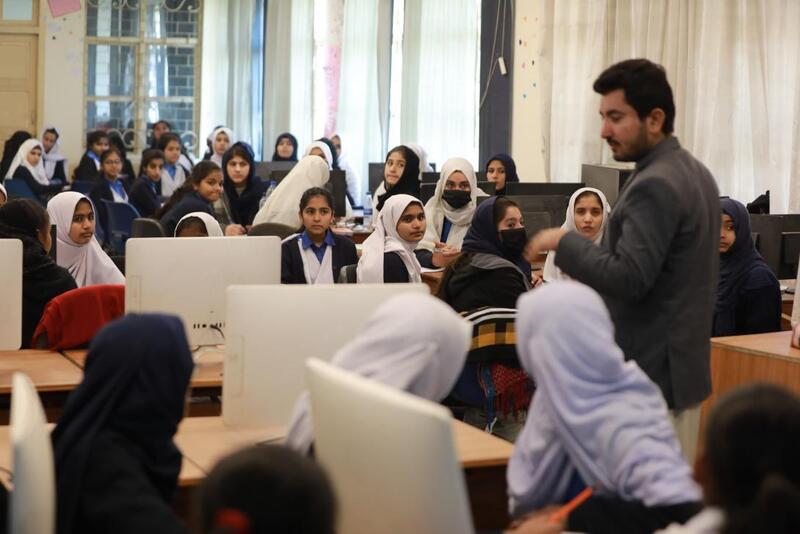Little Climate Warriors
How Pakistani Girls are Leading the Fight Against Climate Change
When his hometown in Pakistan was struck by floods in 2004, Nouman was confronted for the first time with how climate can disrupt education. Twenty years later, as a teacher, he once again witnesses how climate change affects the lives of communities, especially girls. With his project Climate Class Connection, he builds climate resilience in Pakistan from the classroom, with Pakistani girls at the forefront as Little Climate Warriors.
It is 2004, and for yet another year, Pakistan is struck by floods. This time, the small village of Kaka Khel in the Lakki Marwat district lies submerged. Eight-year-old Nouman rides with his sisters on the back of his father’s motorbike, on their way to school ten kilometres away. Then disaster strikes: a flash flood has destroyed the road, causing the family to crash. His father and one of his sisters are severely injured. From that moment on, going to school is no longer a given. “It was an annual phenomenon that we couldn’t go to school due to extreme weather,” Nouman recalls. “It only worked if my father could take us.” A few years later, the family’s farmland is also submerged by another flood. To keep their heads above water, they are forced to sell the motorbike. Along with homes and crops, educational opportunities were destroyed as well. Nouman can still attend a school closer to home, but for his sisters the situation is different: in their village it is considered inappropriate for girls to go to school. Walking was not an option, so they stayed home, eventually dropping out of school.”
Almost 20 years later, Nouman himself stands in front of a class as a Teaching Fellow at Teach for Pakistan when the country is again hit by rising waters. The 2022 floods are immediately the most severe in the past decade. More than 1,700 people lost their lives, and over 26,000 schools were destroyed. The climate disaster also confronts Nouman with how his family was disrupted in 2004. “There are already fewer educational opportunities for girls in Pakistan, but climate extremes make these limitations more frequent and amplify the gap between boys and girls.”
Climate Class Connection
Nouman decides to take action and establishes the organisation Climate Class Connection. The team of motivated young adults behind the organisation aims to promote climate resilience in Pakistani society, focusing on the group most affected by climate change: girls. “It has always been my dream to address climate and gender together,” Nouman says proudly. “Our female teachers are incredibly motivated and succeed in engaging students in climate action.”
Climate Class Connection approaches climate education in several ways. They not only train teachers in climate education using storytelling, project-based learning, and outdoor learning but also engage in research, policy advocacy, and community involvement. “Our flagship initiative is the Climate Bethak,” Nouman explains. “In Pakistan, a bethak is a village meeting where everyone comes together to discuss issues. Our climate bethak is specifically led by female students and teachers, who meet with school boards and other villagers to discuss deeply rooted, context-specific problems and how they can find solutions together.” The bethaks are clearly a success: so far, the organisation has organized six of them, reaching 1,500 girls and over 200 mothers.
Nouman experienced firsthand why such meetings are necessary when teaching: “In Pakistan, many people link climate change to religion. They see it as something from God, a natural phenomenon we cannot change. I noticed the same mindset when teaching at a low-resource school in Islamabad. Students and teachers alike thought it was the government’s job to take action. But now, through our activities, students begin to see patterns and even provide their parents with new insights about climate change.”
Nouman decides to take action and establishes the organisation Climate Class Connection. The team of motivated young adults behind the organisation aims to promote climate resilience in Pakistani society, focusing on the group most affected by climate change: girls. “It has always been my dream to address climate and gender together,” Nouman says proudly. “Our female teachers are incredibly motivated and succeed in engaging students in climate action.”
Climate Class Connection approaches climate education in several ways. They not only train teachers in climate education using storytelling, project-based learning, and outdoor learning but also engage in research, policy advocacy, and community involvement. “Our flagship initiative is the Climate Bethak,” Nouman explains. “In Pakistan, a bethak is a village meeting where everyone comes together to discuss issues. Our climate bethak is specifically led by female students and teachers, who meet with school boards and other villagers to discuss deeply rooted, context-specific problems and how they can find solutions together.” The bethaks are clearly a success: so far, the organisation has organized six of them, reaching 1,500 girls and over 200 mothers.
Nouman experienced firsthand why such meetings are necessary when teaching: “In Pakistan, many people link climate change to religion. They see it as something from God, a natural phenomenon we cannot change. I noticed the same mindset when teaching at a low-resource school in Islamabad. Students and teachers alike thought it was the government’s job to take action. But now, through our activities, students begin to see patterns and even provide their parents with new insights about climate change.”



Taking matters into their own hands
What sets Climate Class Connection apart is the way students take control themselves. The organisation calls them ‘little climate warriors’ and places them at the centre of their initiatives. One school raised about 100,000 Pakistani rupees to hire trained teachers. “There was already a teacher shortage at that school, but it’s remarkable that the students themselves raised funds to invest in their own education,” Nouman says.
One teacher trained by Climate Class Connection, Shamsur Rahman, took his students into the village. A 2020 flood had destroyed 85% of the homes. Meanwhile, the village was rebuilt in the exact same location, leaving the community highly vulnerable to future climate disasters. The students visited farmers, religious leaders, and community organisations to discuss how the flood had impacted their lives. They convinced them of the importance of pressuring the government. “The elders were really surprised that schoolchildren were urging them to act,” Nouman laughs. “But look, now they have a meeting scheduled with the government to discuss measures against future floods.”
What sets Climate Class Connection apart is the way students take control themselves. The organisation calls them ‘little climate warriors’ and places them at the centre of their initiatives. One school raised about 100,000 Pakistani rupees to hire trained teachers. “There was already a teacher shortage at that school, but it’s remarkable that the students themselves raised funds to invest in their own education,” Nouman says.
One teacher trained by Climate Class Connection, Shamsur Rahman, took his students into the village. A 2020 flood had destroyed 85% of the homes. Meanwhile, the village was rebuilt in the exact same location, leaving the community highly vulnerable to future climate disasters. The students visited farmers, religious leaders, and community organisations to discuss how the flood had impacted their lives. They convinced them of the importance of pressuring the government. “The elders were really surprised that schoolchildren were urging them to act,” Nouman laughs. “But look, now they have a meeting scheduled with the government to discuss measures against future floods.”
From Shelter to Climate Hub
Currently, the organisation already reaches more than 5,000 girls across various provinces of Pakistan. The next step is to focus on the school buildings themselves. “I notice that communities and aid organisations donate a lot of items, clothes, and food during emergencies,” Nouman says, “but no one seems to ask how we can continue education. Many schools that are safe from the water serve as temporary shelters in the months following a disaster, and not much else. Teaching simply stops.”
Climate Class Connection therefore aims to turn every school into a climate hub, with trained female teachers and students as community ambassadors. Schools will not only provide lessons for children but also serve the entire community as a place to learn about climate change and what actions can be taken before, during, and after a disaster. “Raising awareness about climate change is no longer enough; we must make people more resilient.” Currently, Climate Class Connection is piloting a project in a school in Nasirabad to develop such a climate hub. In collaboration with UNICEF and Rescue1122, the organisation equips the school with emergency medicine, menstrual products, face masks, and other essential crisis supplies. “It’s important that we consider the needs of each region. Some provinces face more air pollution, while others deal with floods or drought.”
Currently, the organisation already reaches more than 5,000 girls across various provinces of Pakistan. The next step is to focus on the school buildings themselves. “I notice that communities and aid organisations donate a lot of items, clothes, and food during emergencies,” Nouman says, “but no one seems to ask how we can continue education. Many schools that are safe from the water serve as temporary shelters in the months following a disaster, and not much else. Teaching simply stops.”
Climate Class Connection therefore aims to turn every school into a climate hub, with trained female teachers and students as community ambassadors. Schools will not only provide lessons for children but also serve the entire community as a place to learn about climate change and what actions can be taken before, during, and after a disaster. “Raising awareness about climate change is no longer enough; we must make people more resilient.” Currently, Climate Class Connection is piloting a project in a school in Nasirabad to develop such a climate hub. In collaboration with UNICEF and Rescue1122, the organisation equips the school with emergency medicine, menstrual products, face masks, and other essential crisis supplies. “It’s important that we consider the needs of each region. Some provinces face more air pollution, while others deal with floods or drought.”
Recognition
That Climate Class Connection is striking the right chord became clear last year. At the TeachersCOP 29 in 2024, Nouman placed first in the Greening Schools category. TeachersCOP is an international event organised by the Office for Climate Education (OCE) with support from VVOB, highlighting teachers’ efforts in climate education. “This recognition meant a lot to us. With support from the VVOB programme S-Cool-Links, we were able to expand to other regions in Pakistan. The beautiful part is that through TeachersCOP we met so many new people and partners. I can finally say that our organisation is sustainable. We’ve built a network of teachers, schools, interns, and volunteers, and that is crucial. For example, we trained 3,000 teachers in eco entrepreneurship and climate education with support from the Pakistani Ministry of Education.”
Although Climate Class Connection primarily focuses on local partners, the organisation values international partnerships. “The support from S-Cool-Links boosts our visibility and credibility locally. It’s also important that local voices are heard in the global climate education discourse. Those of girls, teachers in underprivileged areas, and small communities. TeachersCOP has played a significant role in this, and I’m incredibly grateful for the platform.”
That Climate Class Connection is striking the right chord became clear last year. At the TeachersCOP 29 in 2024, Nouman placed first in the Greening Schools category. TeachersCOP is an international event organised by the Office for Climate Education (OCE) with support from VVOB, highlighting teachers’ efforts in climate education. “This recognition meant a lot to us. With support from the VVOB programme S-Cool-Links, we were able to expand to other regions in Pakistan. The beautiful part is that through TeachersCOP we met so many new people and partners. I can finally say that our organisation is sustainable. We’ve built a network of teachers, schools, interns, and volunteers, and that is crucial. For example, we trained 3,000 teachers in eco entrepreneurship and climate education with support from the Pakistani Ministry of Education.”
Although Climate Class Connection primarily focuses on local partners, the organisation values international partnerships. “The support from S-Cool-Links boosts our visibility and credibility locally. It’s also important that local voices are heard in the global climate education discourse. Those of girls, teachers in underprivileged areas, and small communities. TeachersCOP has played a significant role in this, and I’m incredibly grateful for the platform.”
Gender
For Nouman, the focus on gender alongside climate education is essential: “Pakistan is a culturally and religiously conservative country. We try to change the mindset of the population. Girls, through Climate Class Connection, are not only educated in climate literacy but also in understanding their potential role in society.”
According to Nouman, misunderstanding often stems from too little interaction: “If you live for years in the same bubble without exposure to other perspectives, you become convinced of your own truth. It’s the same with bridging gender gaps. In Pakistan, men’s and women’s worlds are so separated that the distance feels huge. But if you meet each other with respect for comfort zones and values, you can go far. That’s why we want Climate Class Connection to be a platform for everyone: teachers, fathers, mothers, local leaders, and the youth of Pakistan.”
Visit the S-Cool-Links platform
For Nouman, the focus on gender alongside climate education is essential: “Pakistan is a culturally and religiously conservative country. We try to change the mindset of the population. Girls, through Climate Class Connection, are not only educated in climate literacy but also in understanding their potential role in society.”
According to Nouman, misunderstanding often stems from too little interaction: “If you live for years in the same bubble without exposure to other perspectives, you become convinced of your own truth. It’s the same with bridging gender gaps. In Pakistan, men’s and women’s worlds are so separated that the distance feels huge. But if you meet each other with respect for comfort zones and values, you can go far. That’s why we want Climate Class Connection to be a platform for everyone: teachers, fathers, mothers, local leaders, and the youth of Pakistan.”
Visit the S-Cool-Links platform
Subscribe to our (Dutch) newsletter
|
English








